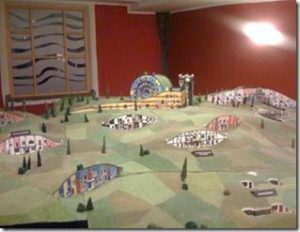I have been traveling quite a bit in the last few weeks and while that doesn’t leave a whole lot of time to write, it allows me to watch out for well-motivated and poorly-motivated terms.
 Here is one that several German terminologists approved of the other day at a meeting in Styria. The house in the picture on the left was designed by architect Friedensreich Hundertwasser and is called Augenschlitzhaus (literally translated: “eye slit house”). The picture on the right shows the model and several of the houses, which are built into the earth. One look at the house and we understood why they were called Augenschlitzhaus.
Here is one that several German terminologists approved of the other day at a meeting in Styria. The house in the picture on the left was designed by architect Friedensreich Hundertwasser and is called Augenschlitzhaus (literally translated: “eye slit house”). The picture on the right shows the model and several of the houses, which are built into the earth. One look at the house and we understood why they were called Augenschlitzhaus.
 I also saw a good example of what I would consider a poorly-motivated term. Unfortunately, I didn’t take a picture. But you are probably all familiar with candles that have a fragrance, some are obnoxious, some are pleasant. They are referred to as fragranced candles. And then industry invented something called defragranced candle. When you look at the term it makes you think that a candle was produced, fragrance was added in the process and then removed again. I am not an expert in candle making, but that is the image I got when I read the term. It distracted me enough that I didn’t buy the candle.
I also saw a good example of what I would consider a poorly-motivated term. Unfortunately, I didn’t take a picture. But you are probably all familiar with candles that have a fragrance, some are obnoxious, some are pleasant. They are referred to as fragranced candles. And then industry invented something called defragranced candle. When you look at the term it makes you think that a candle was produced, fragrance was added in the process and then removed again. I am not an expert in candle making, but that is the image I got when I read the term. It distracted me enough that I didn’t buy the candle.
Can you think of terms that worked really well or didn’t work? Feel free to share them.
One of my favorite examples of untranslatable* terminology is ‘cross-pollination.’ This term was being used by developers and marketing to label the exchange of data between two software products so that they could work well together. The term covered both the exchange, and the special component that enabled the exchange–a lot of work for one term to do! Example: “ABC Cross-Pollination for XYZ.” A Chinese consultant contacted me for help in understanding and translating the term. After some discussion with the developers who invented, and were very fond of, this term, I could see why they liked it. It was an attractive metaphor to encapsulate some complex and nuanced processes that involved exchange. However, when I pointed out that many languages were unlikely to have a direct translation, and even if they did–the nuanced meanings would not match up–they agreed that the superordinate concept was simply an ‘extension’ and that would be accurate, even if it wasn’t as pretty as ‘cross-pollination.’
* Is there a term that means, ‘not translation-friendly’? If not, then we should invent one! My L10N colleagues and I often just say ‘untranslatable’ because we don’t always have time to explain why the term/phrase in question is not Global English, or is likely to cause translation problems in one or more target language. Of course it’s not really and truly untranslatable–just that it might take a paragraph~! How do we express this in a word or phrase?
I am not aware of a better term for something that is not easily translatable, Sue. But let’s see, maybe someone else has a good idea.
Sue, we also use “Untranslatable” at our company. We even have a field for it in our termbase; it’s a checkbox that we can select to let the translators know when they are not “allowed” to translate a term (usually a product name or an abbreviation).
This is interesting. I’m suprised to hear the the candle industry has opted for two such awkward terms (fragranced, defragranced. Scented and unscented are much more common and user-friendly. I like Augenschlitzhaus, though–very visual and accurate when you see the house.
I think it is just one candle maker that went a bit astray with their terminology.
By the way, I really like this site! 😉
Thanks, Christine.
Ironically, the terms “translatable” and “untranslatable” have caused miscommunication between translators on the one hand and writers and editors on the other. Our translators use those terms to designate whether a term SHOULD be translated or not. For example, they might encounter a term in a Java resource.properties file and ask the writer or developer “Is that term translatable?” What they mean is “Should I translate that term, or should I leave it in English?”! And, conversely, if they say that a term is “untranslatable,” they mean that it should not be translated.
I think their usage of those terms is very misguided, but since that is how they use those terms, we have to be aware of that fact in all communications with them. Unfortunately, many of our writers and developers have not caught on to what the translators mean by these terms, and I have seen that lead to considerable confusion.
On the rare occasions that I communicate with our translators, I am careful not to use “translatable” and “untranslatable,” because I refuse to adopt their usage of those terms!
Thank you for your input, John. That is an interesting discussion that probably deserves its own posting.